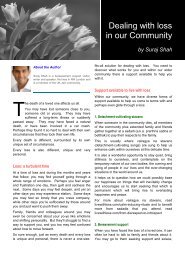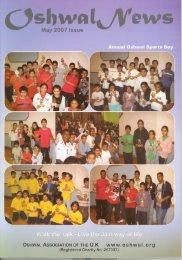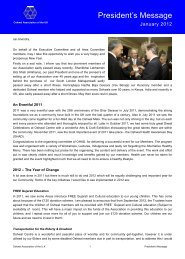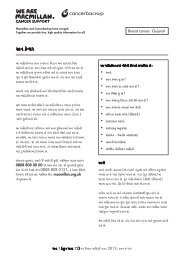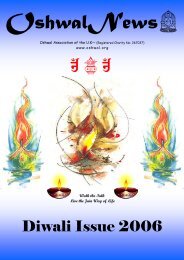Third Edition E-Magazine | April 2013 | www ... - Oshwal Centre
Third Edition E-Magazine | April 2013 | www ... - Oshwal Centre
Third Edition E-Magazine | April 2013 | www ... - Oshwal Centre
Create successful ePaper yourself
Turn your PDF publications into a flip-book with our unique Google optimized e-Paper software.
Jiv Daya<br />
An essential activity for us in the west<br />
Jiv daya is the act of caring for life. For many, the<br />
expression conjures up images of cows being lovingly<br />
cared for at a cow sanctuary. For others, it brings<br />
memories of feeding grain to birds, or the image of ornate<br />
collection boxes at temples through which funds are<br />
passed on to animal sanctuaries in India.<br />
In this article, I outline why jiv daya in the form of support<br />
to animal shelters (panjapols) is an important activity to<br />
participate in, especially for those of us living a modern<br />
western lifestyle. I also offer some thoughts on other<br />
ways in which we might be able to extend the<br />
compassionate spirit of jiv daya in our daily lives.<br />
Living in the UK, it is all too easy to forget our<br />
interconnectedness with the other beings we share the<br />
planet with. We reside in cities where most natural life<br />
has been concreted over. We spend our time in buildings,<br />
which block us from seeing the few plants and animals<br />
that do live around us. And we buy our food from<br />
supermarkets and restaurants - a distant world from the<br />
tropical environments where many of the fruits and<br />
vegetables we eat were grown.<br />
Although we may not see it directly, our lifestyles have a<br />
huge impact on the world around us and the creatures we<br />
share the earth with. When we build on new land, we<br />
displace living creatures who were there before us. As<br />
the land used for farming increases to support the world's<br />
growing population, less space remains for wild plants<br />
and animals. And when we farm fruits, vegetables and<br />
grains, we deliberately protect the crop (often through<br />
violent means) from insects, birds and mammals in order<br />
to ensure a bountiful harvest for ourselves.<br />
Our demand for certain products can have an even<br />
greater impact on the animals. Protocols encouraging<br />
animal testing mean that innocent beings are brutally<br />
tortured in order to serve our demand for medicines and<br />
cosmetics. And because cows need to be made<br />
pregnant in order to give milk and are only productive for<br />
a fraction of their natural lifespan, millions of cows and<br />
calves are killed each year as a direct result of our taste<br />
for milk.<br />
For many of the animals we displace or harm as a result<br />
of our lifestyles, panjapols (animal sanctuaries) are the<br />
ONLY the safe place to go. They are places where<br />
animals can live freely and peacefully without being<br />
suppressed or exploited. They are places where animals<br />
receive unconditional love and care, and can express<br />
natural behaviours. They are places of true compassion.<br />
Unfortunately, there are far more animals in need of<br />
support than there are spaces in animal sanctuaries.<br />
Each year in the UK, about 800,000 unwanted male<br />
calves born to dairy cows are sent to slaughter shortly<br />
after being born - only a handful will be lucky enough to<br />
be saved and taken in by a panjapol. In India, the lack of<br />
space for retired dairy cows at gaushalas (cow shelters)<br />
has resulted in the country becoming the world’s biggest<br />
exporter of beef.<br />
The sad truth is that most panjapols and gaushalas are<br />
desperately underfunded. Most struggle to meet the cost<br />
of day-to-day feed and medicines, let alone the costs of<br />
repairs and maintenance for barns and shelters. Without<br />
more support, taking in more animals just won’t be<br />
possible.<br />
Jiv daya, in the traditional form of support for panjapols, is<br />
generally offered in two ways - money and time. By<br />
offering money and encouraging others to do the same,<br />
you enable panjapols to improve their facilities and take in<br />
more animals, extending their reach. And by visiting<br />
sanctuaries and volunteering directly, you not only get the<br />
chance to learn about the animals and support them<br />
directly, but you also gain a powerful opportunity for<br />
personal development and inner transformation.<br />
In western society, our lifestyles often run counter to the<br />
principle of aparigraha (non possessiveness or nonattachment).<br />
Success is typically defined by the<br />
accumulation of wealth or power, not by strength of<br />
character, kindness or humility. Most actions are carried<br />
out with some degree of attachment or expectation – be it<br />
in the form of financial return, reciprocation or recognition.<br />
Very often, it can even feel like society actually<br />
discourages us from giving unless we are going to get<br />
something in return.<br />
Spending time at a panjapols helps us reflect on the<br />
nature of our daily lives and is a helpful counterbalance to<br />
the individualistic pressures of western society.<br />
Panjapols open our eyes to the tireless work that fellow<br />
humans do to support other living beings, without<br />
<strong>Oshwal</strong> News E-magazine of the O.A.U.K. 21 <strong>April</strong> <strong>2013</strong> <strong>Edition</strong>





